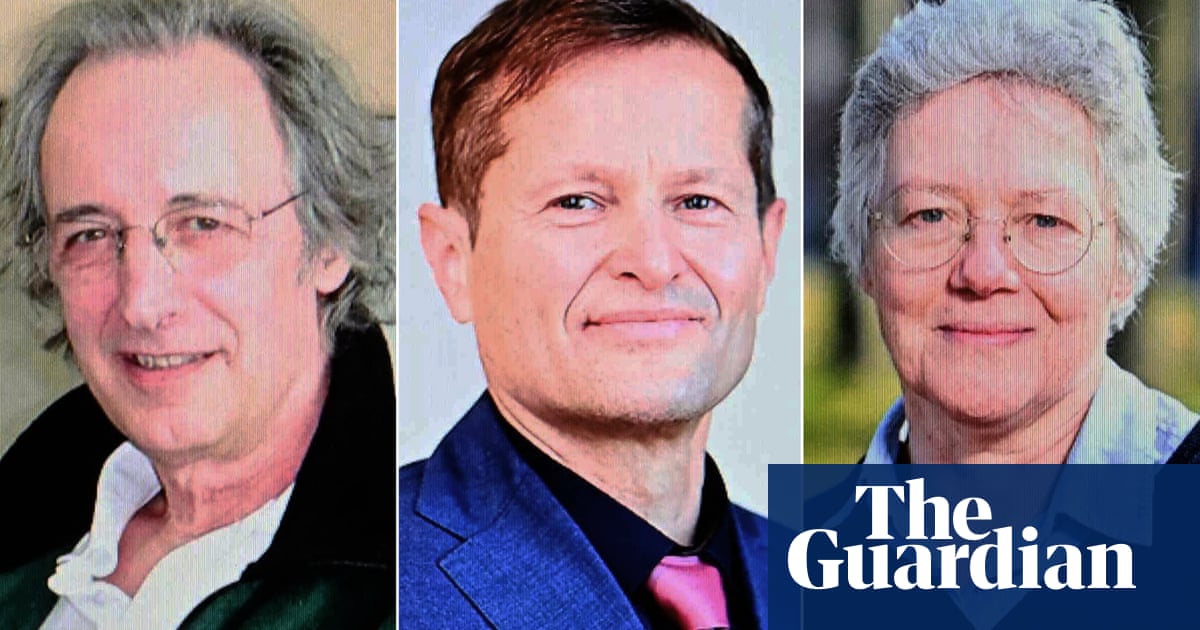
Three scientists have won the 2021 Nobel prize in physics for their groundbreaking contributions to our understanding of complex physical systems – including how humanity influences the Earth’s climate.
The winners, Syukuro Manabe, Klaus Hasselmann and Giorgio Parisi, will share the award, announced on Tuesday, presented by the Royal Swedish Academy of Sciences and worth 10m Swedish kronor (£870,000).
One half of the prize was jointly awarded to Manabe and Hasselmann for their physical modelling of Earth’s climate, quantifying variability and reliably predicting global heating. The other half went to Parisi for his discovery of the interplay of disorder and fluctuations in physical systems from atomic to planetary scales.
Characterised by randomness and disorder, complex systems are difficult to understand, but this year’s prize recognised new methods for describing them and predicting their long-term behaviour.
Paul Hardaker, the chief executive of the Institute of Physics, said: “Whilst complex systems are difficult to deal with mathematically they are all around us and affect our lives in many different ways, not least through the way they affect the nature of our weather and climate.
“Their work has laid the foundations for our understanding of the Earth system and the impact of our interactions with it. Never has this been more important than in what we are doing now to tackle the challenges of our changing climate and move toward a new green economy.”
Manabe, a senior meteorologist at Princeton University, demonstrated how increased levels of carbon dioxide in the atmosphere can lead to increased temperatures at the Earth’s surface. During the 1960s he also led the development of physical models of the Earth’s climate, laying the foundations for the climate models in use today.
About 10 years later, Hasselmann, a professor at the Max Planck Institute for Meteorology in Hamburg, Germany, created a separate model that linked together weather and climate, helping to answer the question of why climate models can be reliable despite the weather being changeable and chaotic.
He also developed methods for identifying specific signals that natural phenomena and human activities imprint in the climate, demonstrating that increased atmospheric temperatures can be linked to human carbon dioxide emissions.
Professor Ralf Toumi, co-director of the Grantham Institute at Imperial College London, said: “It is almost impossible to imagine that there would be such widespread call for action on climate change without the work of many modellers, but particularly Manabe and Hasselman.”
Parisi’s groundbreaking work focused on identifying hidden patterns in disordered complex materials called spin glasses, making it possible to understand and describe many different and apparently entirely random materials and phenomena.
“[He] tamed this complicated landscape by building a deep physical and mathematical model which was so broad that it has impacted a vast range of fields far beyond spin glasses, from how granular materials pack, to neuroscience, to how we compute to random lasers, and to emergent phenomenon far beyond what he envisioned in the 1970s when he started this work,” said the Nobel committee member John Wettlaufer, a professor of earth and planetary sciences at Yale University in the US.
Thors Hans Hansson, the chair of the Nobel committee for physics, said: “Although the prize is divided into two parts, there is the common theme that has to do with how disorder and fluctuations together – if you understand it properly – can give rise to something that we can understand and predict.
“The discoveries being recognised this year demonstrate that our knowledge about the climate rests on a solid scientific foundation, based on a rigorous analysis of observations. This year’s laureates have all contributed to us gaining deeper insight into the properties and evolution of complex physical systems.”
Asked about the timing of the award, Parisi, a professor at Sapienza University of Rome, Italy, said: “We are in a situation where we can have a positive feedback that may accelerate the increase of temperature. It is clear that for the future generations, we have to act now in a very fast way and not with a strong delay.”
Physics was the prize area that Alfred Nobel mentioned first in his will from 1895, dictating that his entire remaining estate should be used to endow “prizes to those who, during the preceding year, have conferred the greatest benefit to humankind”.
The other awards are prizes for physics and chemistry, physiology or medicine, literature, and the championship of peace.












